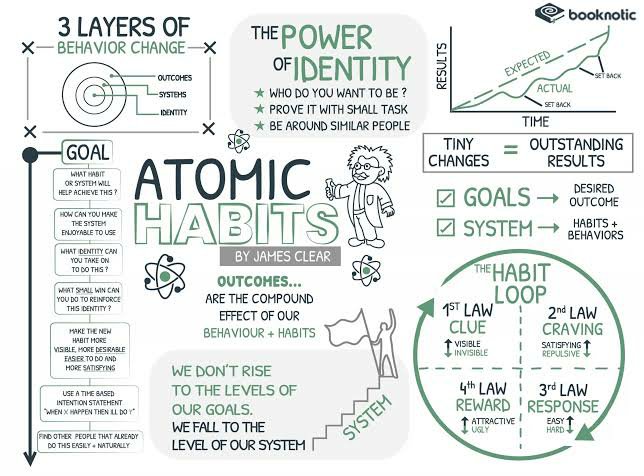
“Your outcomes are a lagging measure of your habits. Your net worth is a lagging measure of your financial habits. Your weight is a lagging measure of your eating habits. Your knowledge is a lagging measure of your learning habits. You get what you repeat.”
Atomic Habits , a breakthrough book from James Clear is the most comprehensive guide on how to change your habits and get better every day. This short note based on the book, is written in two parts. Part one helps us understand the importance of our habits and why they matter. More importantly, it provides answers to a series of “How to” questions that naturally occur in the context of building good habits and breaking the bad ones. In the second part of the note, six important ideas, concepts and principles are summarised that will help the reader in building habits that he or she desires to.
Part One – What ? Why ? How ?
– What is a Habit ?
– Why do Habits Matter ?
– How Habits Work ?
– How To Start A New Habit?
– How to Build Better Habits ?
– How to Break Bad Habits ?
– How to Enjoy Habits that are Hard ?
What is a Habit ?
“Habits + Deliberate Practice = Mastery”
Habits are mental shortcuts. A habit is a routine or behavior that is carried out repeatedly and most of the time automatically. When you are faced with a problem repeatedly, your brain starts to automate the process of solving it. Your habits are sets of automatic solutions that solve the problems you come across regularly.The ultimate purpose of habits is to solve the problems of life with as little energy and effort as possible. A habit is a behavior that has been repeated enough times to become automatic.
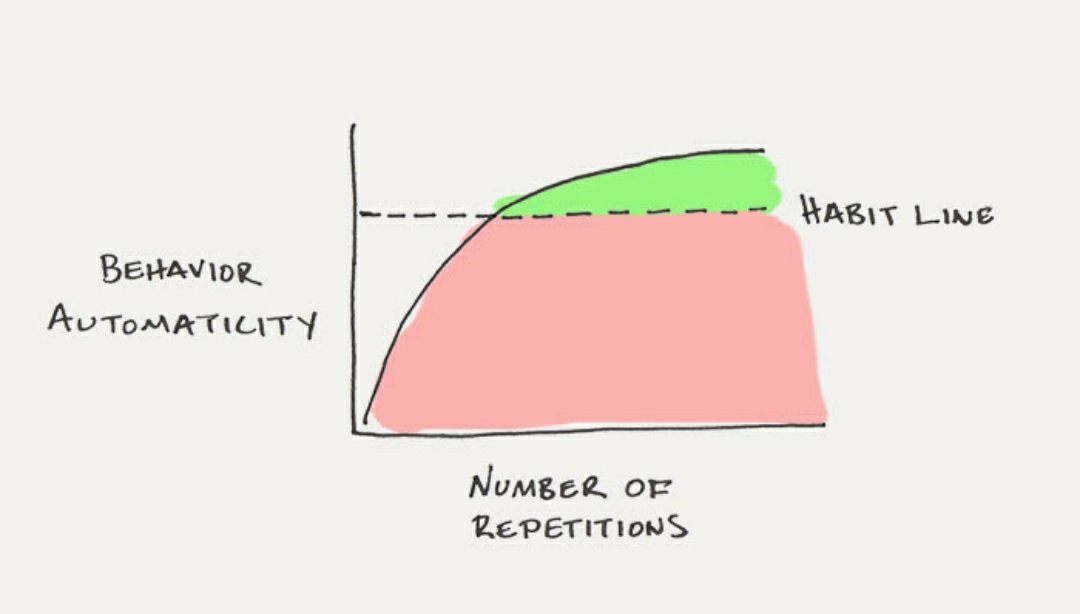
If you find yourself struggling to build a good habit or break a bad one, it is not because you have lost your ability to improve. It is often because you have not yet crossed what James Clear calls, Plateau of Latent Potential. When you finally break through the Plateau of Latent Potential, people will call it an overnight success. Habits are the compound interest of self-improvement.
The upside of habits is that we can do things without thinking. The downside is that we stop paying attention to little errors. Reflection and review is a process that allows you to remain conscious of your performance over time. The tighter we cling to an identity, the harder it becomes to grow beyond it.
Why do Habits Matter ?
IDENTITY -> PROCESSES -> OUTCOMES
Habits shape our identity. Our actions define who we are. Our habits are a reflection of our identity. The more we repeat a behavior, the more we reinforce the identity associated with that behavior. For example: if you make your bed every day, you are reinforcing the identity of someone who is organized and tidy.
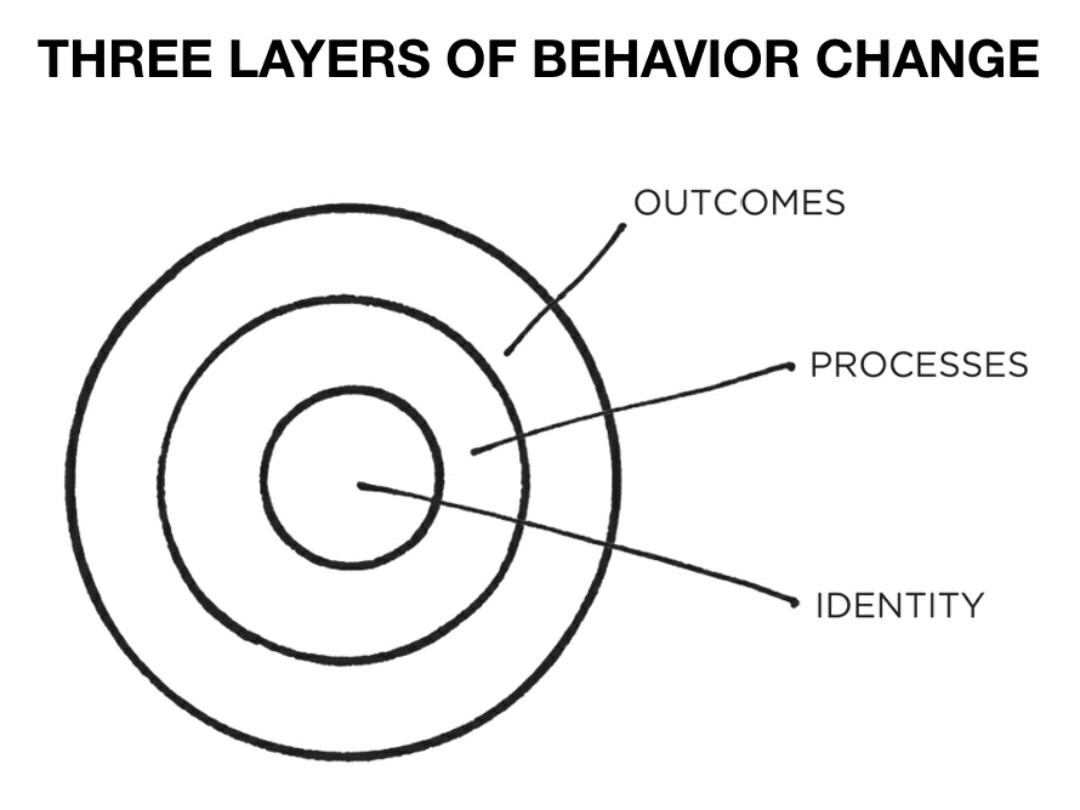
There are three layers of behavior change:
1. Change in your outcomes. This means changing your results, for example, losing weight.
2. Change in your processes. This means changing your habits and systems: for example, developing a daily exercise routine and diet.
3. Change in your identity. This means changing your beliefs: the way you see yourself and the ones around you. For example, if you exercise regularly, you are reinforcing the identity of someone who is fit and healthy.
With outcome-based habits, the focus is on what you want to achieve. With identity-based habits, the focus is on who you wish to become. James Clear argues that the best way to change our identity is to focus on changing our habits. By starting with small, easy habits, we can gradually build up a new identity that is more aligned with our goals. True behavior change is identity change. You could choose and start a habit because of motivation, but you’ll stick with it only if it becomes part of your identity. The real reason habits matter is not because they can get you better results (although they can do that), but because they can change your beliefs about yourself.
How Habits Work ?
CUE -> CRAVING -> RESPONSE -> REWARD
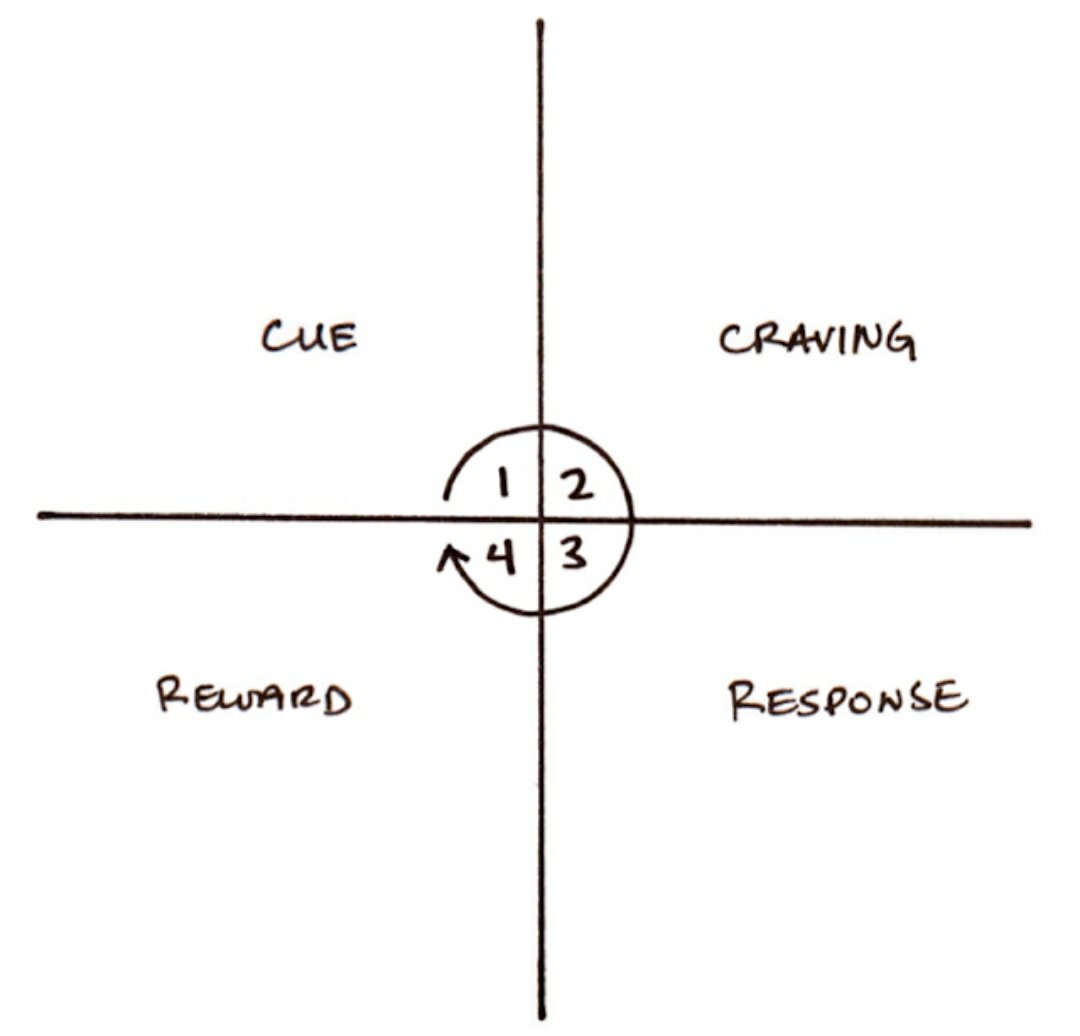
The main components of habit formation are:
1. Cue: It causes your brain to begin a behavior. It is a bit of information that predicts a reward.
2. Craving: It is the motivation behind every habit. Without a desire, we don’t have a reason to act.
3. Response: This is the very habit you perform; it can take the form of a thought or an action.
4. Reward: The end goal of every habit.
Habit formation is the process by which a behavior becomes progressively more automatic through repetition. The amount of time you have been performing a habit is not as important as the number of times you have performed it.You could do something three times in thirty days, or three hundred times. The frequency will always make the difference.
Habits are attractive when we associate them with positive feelings and unattractive when we associate them with negative feelings.
How To Start A New Habit?
‘After [CURRENT HABIT], I will [NEW HABIT].
One of the best ways to build a new habit is to identify a current habit you already do each day and then stack your new behavior on top. This is called habit stacking. The two most common cues are time and location. Creating an implementation intention is a strategy you can use to pair a new habit with a specific time and location. Habit stacking is a strategy you can use to pair a new habit with a current habit.
The habit stacking formula is: ‘After [CURRENT HABIT], I will [NEW HABIT].
Using the Environment to Build New Habits.
Environment is the invisible hand that shapes human behavior. Small changes in context can lead to large changes in behavior over time. Every habit is initiated by a cue. We are more likely to notice cues that stand out. Make the cues of good habits obvious in your environment. Gradually, your habits become associated not with a single trigger but with the entire context surrounding the behavior. The context becomes the cue. It is easier to build new habits in a new environment because you are not fighting against old cue
How to Build Better Habits ?
A habit needs to be enjoyable for it to last. What is instantly rewarded is done again. what instantly punished is ditched. To get a habit to stick You need to feel instantly successful, even if in a small way. The Four Laws of Behavior Change are a simple set of rules we can use to build better habits. For example, If we wish to build a habit of a daily work out, here’s how we can apply this 4 point formula.
1. Make it obvious
Put your gym bag by the door so you see it first thing in the morning.
2. Make it attractive
Listen to your favorite music while you work out.
3. Make it easy
Start your day with a 10-minute walk.
4. Make it satisfying
Write down your progress in a habit tracker.
How to Break Bad Habits ?
Self-control is a short-term strategy when forming habits. You may be able to resist temptation once, but you will most likely not be able to have the willpower to control your desires each time they appear. A better method is to cut bad habits off at the source. For example, if some want’s to get out of the habit of smoking, here’s how he can apply this 4 point formula.
1. Make it invisible.
Hide your cigarettes so you don’t see them every time.
2. Make it unappealing.
Think about how bad your breath smells after you smoking.
3. Make it hard to perform.
Set a goal to work for 25 minutes, even if you don’t feel like it.
4. Make it frustrating.
Remember how bad slacking off feels.
How to Enjoy Habits that are Hard ?
Create a motivation ritual by doing something you really like right before a difficult habit.
Part Two – Ideas, Concepts, Principles
– 1% Improvement Everyday
– The 2-Minute Rule
– The Goldilocks Rule for Staying Motivated
– The Law Of Least Effort
– Walk Slowly, But Never Backward
– Focus on Systems
1% Improvement Everyday
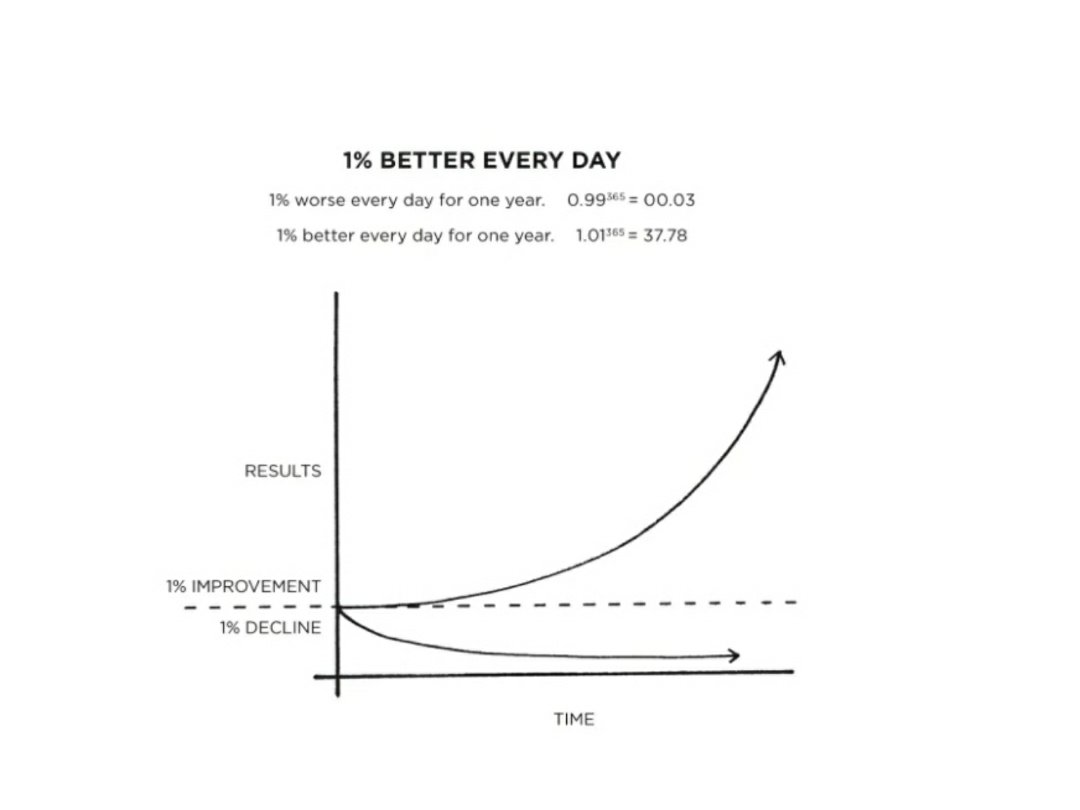
“If you can get 1 % better each day you will end up 37 times better by the time you’re done.
If you get worst 1% every single day end up reaching nearly 0″ – JAMES CLEAR
Getting 1 percent better every day counts for a lot in the long-run. It is about the cycle of endless refinement and continuous improvement. Habits are the compound interest of self-improvement.
The 2-Minute Rule
If you can do an action in two minutes or less, tackle it at the moment — and don’t delay.
The rule was created by David Allen in Getting Things Done & James Clear recommends it for habit building as well: When you start a new habit it should take less than two minutes to do.
Any habit can be scaled down into a 2-minute version:
• Read before bed each night becomes read one page;
• 30 minutes of exercise becomes take out my yoga mat;
• Fold the laundry becomes fold one pair of socks.
The Goldilocks Rule for Staying Motivated
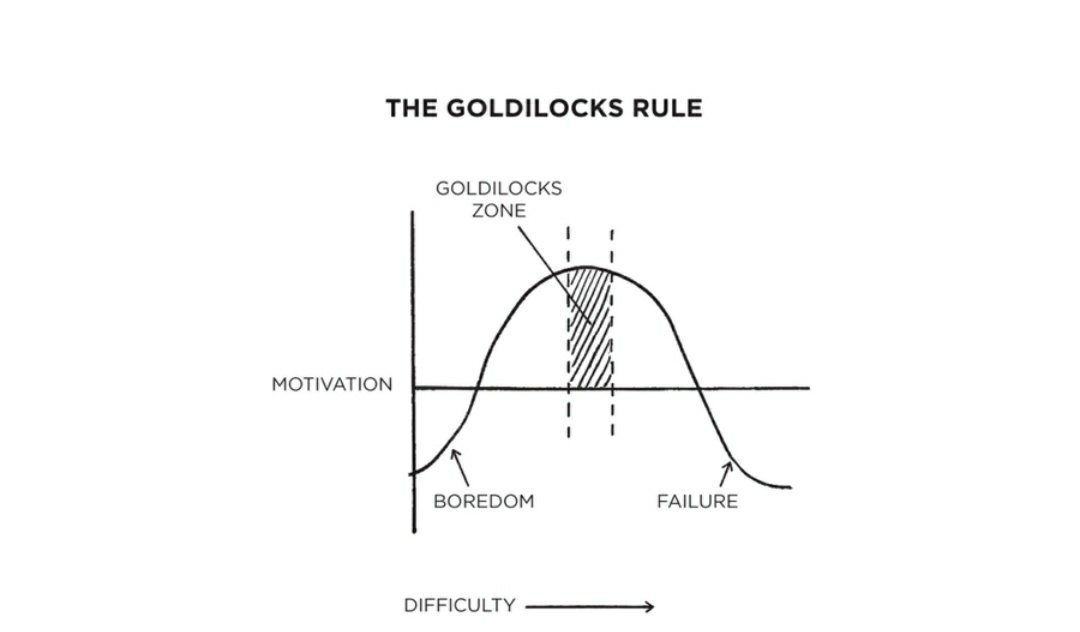
We experience peak motivation when we are performing actions that are right on the edge our current abilities. Not too difficult, not too easy.
The Law Of Least Effort
We will instinctively choose the path that requires least amount of work. This is a universal law that has huge implications in habit formation:
• Create an environment where doing the right thing is as easy as possible.
• Reduce the friction associated with good behaviors. When friction is low, habits are easy.
• Increase the friction associated with bad behaviors. When friction is high, habits are difficult.
Walk Slowly, But Never Backward
It’s easy to get discouraged when you’re trying to change your habits, especially if you don’t see results immediately. But if you keep taking small steps forward, even if they’re not huge, you’ll eventually reach your goals.
For example: if you’re trying to lose weight, you might be tempted to skip a workout or eat a unhealthy meal. But if you do that, you’ll be setting yourself back. It’s better to make small, healthy choices that will help you reach your goals in the long run.
Focus on Systems
Goals are good for establishing a direction, but systems are best for making progress. Goals are about the results you hope to reach. Systems are about the mechanisms that lead to those results.
To conclude, let’s accept that on an average 90% of our daily decisions happen automatically, many shaped by our environment. Thus, most decisions are a habit, not a deliberate choice. Therefore, to make smarter choices, we need to design smarter defaults. And so, habits can be developed by shaping the invisible defaults of life.











